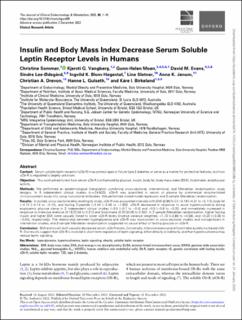Insulin and Body Mass Index Decrease Serum Soluble Leptin Receptor Levels in Humans
Sommer, Christine; Vangberg, Kjersti G.; Moen, Gunn-Helen Øiseth; Evans, David M.; Lee-Ødegård, Sindre; Høgestøl, Ingvild Kristine; Sletner, Line; Jenum, Anne Karen; Drevon, Christian A.; Gulseth, Hanne Løvdal; Birkeland, Kåre Inge
Peer reviewed, Journal article
Published version
Permanent lenke
https://hdl.handle.net/11250/3057394Utgivelsesdato
2022Metadata
Vis full innførselSamlinger
Originalversjon
Journal of Clinical Endocrinology and Metabolism (JCEM). 2022, . 10.1210/clinem/dgac699Sammendrag
Context
Serum soluble leptin receptor (sOb-R) may protect against future type 2 diabetes or serve as a marker for protective features, but how sOb-R is regulated is largely unknown.
Objective
This work aimed to test how serum sOb-R is influenced by glucose, insulin, body fat, body mass index (BMI), food intake, and physical activity.
Methods
We performed an epidemiological triangulation combining cross-sectional, interventional, and Mendelian randomization study designs. In 5 independent clinical studies (n = 24-823), sOb-R was quantified in serum or plasma by commercial enzyme-linked immunosorbent assay kits using monoclonal antibodies. We performed mixed-model regression and 2-sample Mendelian randomization.
Results
In pooled, cross-sectional data, leveling by study, sOb-R was associated inversely with BMI (β [95% CI] −0.19 [−0.21 to −0.17]), body fat (−0.12 [−0.14 to −0.10), and fasting C-peptide (−2.04 [−2.46 to −1.62]). sOb-R decreased in response to acute hyperinsulinemia during euglycemic glucose clamp in 2 independent clinical studies (−0.5 [−0.7 to −0.4] and −0.5 [−0.6 to −0.3]), and immediately increased in response to intensive exercise (0.18 [0.04 to 0.31]) and food intake (0.20 [0.06 to 0.34]). In 2-sample Mendelian randomization, higher fasting insulin and higher BMI were causally linked to lower sOb-R levels (inverse variance weighted, −1.72 [−2.86 to −0.58], and −0.20 [−0.36 to −0.04], respectively). The relationship between hyperglycemia and sOb-R was inconsistent in cross-sectional studies and nonsignificant in intervention studies, and 2-sample Mendelian randomization suggested no causal effect of fasting glucose on sOb-R.
Conclusion
BMI and insulin both causally decreased serum sOb-R levels. Conversely, intensive exercise and food intake acutely increased sOb-R. Our results suggest that sOb-R is involved in short-term regulation of leptin signaling, either directly or indirectly, and that hyperinsulinemia may reduce leptin signaling.

